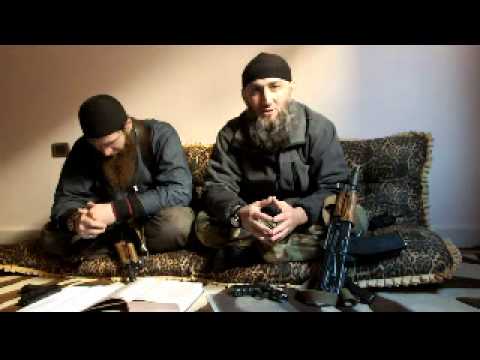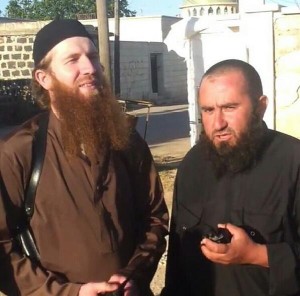Umar al-Shishani, the Chechen Emir of the Islamic State of Iraq and ash-Sham’s northern region, has issued another video message. This is the second part of a three-part series filmed in conjunction with FiSyria, the Russian-language, pro-jihad website close to Umar, in response to reader questions.
Read the first part here:
Umar al-Shishani – “Jaish al-Muhajireen wal Ansar Joined ISIS After Al-Baghdadi Oath”
The videos also feature Abu Jihad, another ethnic Chechen the recently-named Emir of ISIS in ad-Dana, and were made in response to questions and criticisms leveled at Umar after he pledged an oath of allegiance last month to the leader of ISIS, Abu Bakr al-Baghdadi.
(Photo: A Recent Image of Umar al-Shishani)
See: Umar al-Shishani – “Jaish al-Muhajireen wal Ansar Joined ISIS After Al-Baghdadi Oath”
In this new video, Umar and Abu Jihad discuss the need to unite, and explain why spoils of war need to be distributed according to the Quran.
We have translated and summarized some of the key points below.
UMAR AL SHISHANI discusses the need for the Mujahideen to unite (this is part of his explanation of why he pledged an oath of allegiance to the leader of ISIS, Abu Bakr al-Baghdadi last month.)
Umar explains how the Islamic Ummah was divided and conquered by the infidels using an analogy: he says that a man cannot eat an entire loaf of bread just like that, he has to cut it into slices and eat it that way. That, Umar says, is what happened to the Ummah: it got divided up and conquered piecemeal, and that is how and the laws of the infidels got put in place on Islamic lands.
One of the points Umar makes is that the local people in Syria are keen to accept an Islamic State and to choose ISIS’s interpretation of Islam, as preached by the Mujahideen.
Umar says he has been in Syria for a year and 7 months and when he first got there, there were a lot of divisions. He describes how local people were excited about the Quran, and they came to religion like a man who was very hungry and that’s how they accepted Islam. Now there are lots of Muslims learning the Quran and this is a real result, he adds. Meanwhile, Western forces have been trying to infiltrate Syria with their concepts of democracy and so on.
What is needed is for the Mujahideen to unite, so that Syria can be defended and so that the laws of Allah can be implemented, Umar explains.
Abu Umar now talks about a tour he made this week — at this point the video is interspersed with still shots of the local landscape — and points out that he saw a great deal of banners proclaiming the Islamic State of Iraq and ash-Sham around in ad-Dana and also in the “oblast” (i.e. province) of Raqqa.
Abu Umar talks about a unification that will stretch from Raqqa to ad-Dana in Idlib Province.
Of course there will be some people who try to fight against us and oppose us.
Abu Jihad then takes over and offers to say a few words about unification. The video now shows stills of various world leaders greeting each other, including Vladimir Putin with Chechen leader Ramzan Kadyrov, and Bashar al-Assad with the Saudi King. We are also shown images of police officers standing next to praying Muslims, and crying children. Everyone is against the Mujahideen, and against the Muslims, is Abu Jihad’s point.
Yet the Muslims are one, Abu Jihad says: “we have one book. We are one.”
Abu Jihad goes on to make the case for unification: when there is no unity, every group is fighting its own battles for its own territory. But for unification to take place, there needs to be an Imam, a leader, who will set his own conditions.
Later in the video, ABU JIHAD discusses the topic of how to divide spoils of war captured from the Assad regime and the various issues involved in doing so.
Abu Jihad discusses why, under Islam and the rules of jihad, the spoils of war cannot simply be divided among the victorious army. During the reign of Caliph Umar, the division of spoils between the Islamic State and the conquering warriors was restricted such that a fifth of the spoils were retained for the Islamic State to be used for common benefit, while the remaining 80% were distributed among the Mujahideen. There are different rules for different types of spoils, i.e. booty obtained by fighting and booty obtained when an enemy retreats.
Abu Jihad offers some examples. If there is a tank, this cannot be simply divided up among the Mujahideen, it needs to be sold. Weapons are used against the infidels. Abu Jihad explains that the Islamic State cannot temporarily divide a fifth of its spoils among all the Muhajideen because then it would have no weapons left to build itself up into a larger fighting force.
Abu Jihad adds that he and Umar do not have time to make a lot of videos because they have other work to do, but they will make more to address reader questions. FiSyria has invited its readers to email in with questions for Umar or Abu Jihad.
See also:
Chechen ISIS leader Umar al-Shishani “Likes To Spend Time In Jacuzzi In His Aleppo Villa”
ISIS Chechen Leader Umar al-Shishani — “Dokka Umarov Financed Us”
The “True” Story of Insurgent Leader Umar al-Shishani — & What It Means


